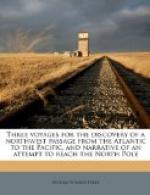On the morning of the 26th we again stood to the westward as much as the ice would allow, but were soon obliged by it to keep away to the southward, precluding every hope of making the land on that part of the coast which it would have been most interesting to explore. In the afternoon, after various attempts to get to the westward, appearances became more unpromising than ever, the packed ice extending from N.b.E. round to S.W. There were, indeed, parts of the ice which, with constant daylight, a ship might have entered with some probability of success; but, with twelve hours’ night, the attempt must have been attended with a degree of risk which nothing but a very important object could justify. The wind had now freshened up from the N.N.W., and the mercury in the barometer fell with unusual rapidity, with every other appearance of an approaching gale. I was therefore under the necessity of admitting the conclusion that, under existing circumstances, the season was now too far advanced, and the state of the ice too unfavourable, to allow of any farther examination of the coast; and I determined, therefore, to make the best of my way to England. The boats were accordingly hoisted in, and the ships made snug while in smooth water under the lee of the ice, and a course was then shaped to the E.S.E., in order to obtain an offing before we bore away to the southward.
On the second of October, in scudding before the wind under the main-topsail, a heavy sea struck the Hecla on the larboard quarter, rendering it necessary to press her forward under more canvass, by which we lost sight of the Griper in the course of the morning. As soon as the weather moderated, we hove-to for her; but, as she did not make her appearance, having, as we afterward learned, been obliged to lie-to during the height of the gale, we continued our course out of the Straits, and did not again meet with the Griper till our return to England.
On the afternoon of the 16th, the sea being very high and irregular, and the ship pitching with considerable violence, the bowsprit was carried away close to the gammoning, and the foremast and main-topmast immediately followed it over the side. The wreck was quickly cleared; and, by the greatest activity and energy on the part of the officers and men, the mainyard and mainmast were saved, the latter having been endangered by the foremast falling across the stay, and the former by the wreck of the main-topmast and top-sail-yard lying upon it. Notwithstanding the continuance of the gale, and the uneasy motion of the ship for the next two days, we succeeded in getting up our jury masts so as to make sail on the evening of the 18th.
On the 29th we made Buchaness, and on the following day, the wind having come to the southward, so as to make our progress very slow, I landed at Peterhead, accompanied by Captain Sabine and Mr. Hooper; having first, in compliance with their lordships’ directions, demanded from the officers, petty officers, and all other persons on board the Hecla, the logs, journals, charts, drawings, and other documents which the voyage had furnished, and directed Lieutenant Beechey to proceed with all possible despatch to Leith. Captain Sabine and myself proceeded without delay to London, where we arrived on the morning of the 3d of November.




